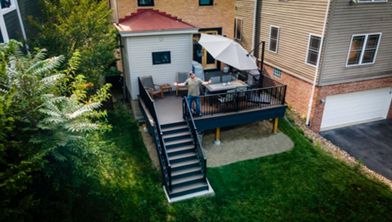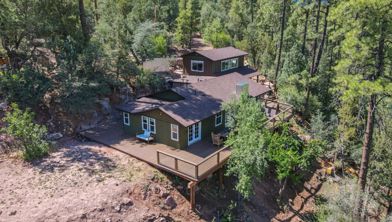Deck Planning 101: How Much Should You Spend?
Start your deck project with confidence—our detailed guide will help you figure out the right budget to make your outdoor space a reality.
How much should you spend on your deck? That's the top question we hear from our customers when they are planning their deck build. The real answer? It depends. Home improvement is personal. There's no one-size-fits-all approach, and the answer comes down to figuring out what's right for you. Investing in a deck is more than just a financial decision; it's an investment in your lifestyle. To truly answer the question, "How much should I spend?" requires a thoughtful examination of various lifestyle factors.
Investing in a deck is more than just a financial decision; it's an investment in your lifestyle.
Let's delve into the key questions to ask yourself to help define the budget for your next deck.
How Do You Want to Use Your Outdoor Space?
By clearly defining how you want to use your deck, you can more effectively plan your budget and design. For those who love entertaining, investing in durable materials and high-quality amenities (think: outdoor kitchen, built-in bar, and outdoor furniture) that can withstand frequent use and various weather conditions are crucial.
If relaxation is your goal, spending on comfort-enhancing features and low-maintenance materials that reduce upkeep will be a wise investment. Aligning your deck's design and budget with your lifestyle preferences ensures that the space meets your needs and maximizes your outdoor living experience.
Who Are You Planning Your Deck For?
When planning and budgeting for your new deck, it's essential to consider the specific needs and preferences of everyone who will be using the space. For families with young children, safety features such as railings and gates are a top priority to create a secure environment. Additionally, creating a larger open space for play and games can make the deck a versatile area for family fun. As children grow older, the focus may shift towards creating zones for relaxing and socializing, ensuring the deck evolves with your family's changing dynamics.
Pro Tip
For more kid-friendly deck ideas, check out 6 Best Features to Add to Your Deck If You Have Children.
Pet owners should also consider pet-friendly design elements in their deck plans to enhance enjoyment for both themselves and their furry companions. Consider features such as gates to keep pets secure, built-in water stations to keep them hydrated, and designated areas for pet activities. Choosing decking materials that are stain- and scratch-resistant and easy to clean, such as composite decking, is particularly beneficial for households with pets. These materials not only stand up to wear and tear but also provide a splinter-free surface, ensuring a safer and more comfortable space for pets and humans alike.
Pro Tip
For more ideas on pet-friendly decks, explore 7 Best Deck Ideas for Dog Owners.
Also, it's wise to think about future needs, including the possibility of aging relatives or family members with disabilities joining your household. Incorporating features that enhance accessibility and comfort, such as ramps instead of stairs, ADA-compliant handrails, and additional lighting, can make the deck more accommodating. Planning for these aspects in advance ensures that your deck remains a functional and welcoming space for all family members, regardless of age or mobility.
By considering the diverse needs of your household, you can design a deck that offers enjoyment and utility for years to come, making it a true extension of your home.
What Style Do You Want for Your Outdoor Space?
Your style preferences can significantly impact your deck project budget. Modern and unique designs, like curved deck plans, cable railings, and shade features, typically have a higher price tag. If you're aiming for a high-end look, budget accordingly. However, there are plenty of stylish options that won't break the bank.
Pro Tip
Explore different styles to get an idea of what's possible for your next deck project with the Trex style inspiration section.
Ultimately, your deck should reflect your personal style and complement your home's architecture. Whether you prefer a contemporary, rustic, or coastal design, invest in materials and finishes that align with your vision.
Will You DIY or Hire a Contractor for Your Deck Project?
When considering deck building, deciding between DIY and hiring a contractor can have a substantial effect on your budget. DIYing a deck can be an excellent choice for those with the right skills, as you save on labor costs, which typically account for a significant portion of the project's expenses. However, it’s important to recognize that DIY is not for everyone. Building a deck requires not only basic carpentry skills but also knowledge of structural integrity and safety regulations. If you are confident in your abilities and have the necessary expertise, DIYing can be a rewarding and cost-effective project. However, be aware that it demands careful planning and substantial physical effort, which should be factored into your budgeting decision. The opportunity cost of time spent on the project instead of other personal or professional activities can also be significant.
On the flip side, hiring a contractor ensures that your deck is built to code, safely, and often more efficiently. Professionals bring expertise, tools, and experience that can streamline the process and prevent costly errors. While the upfront cost is higher, it often saves money in the long run by avoiding mistakes. It’s not uncommon for DIY enthusiasts to get overwhelmed by the complexity of the task and ultimately have to hire a contractor to fix and complete the job. This scenario results in higher costs due to wasted materials and the need for corrective work. If you start to feel out of your depth, it’s wise to consider professional help to ensure the project stays within budget and timeline, ultimately providing peace of mind and a durable, safe deck.
Pro Tip
If you're considering building a Trex deck and want to find a contractor with proven expertise, you can use our Find a TrexPro tool: Find a TrexPro.
Are You Building a New Deck or Remodeling an Existing Deck or Patio?
One factor that can affect your overall project budget is whether you are starting from scratch or updating an existing outdoor living space. For families interested in a new deck project, you can focus your budget on creating your ideal outdoor space. However, many homeowners start a decking project to improve an existing outdoor space, like a deteriorating deck or cracked concrete patio. For these projects, you may face a slightly higher expense as you'll need to address existing issues alongside creating the new space.
It isn't all bad news if you are remodeling your space. In some cases, your existing project can be used as a base for your deck. Be sure to ask your builder if your project qualifies for a decking resurface or if you can build over your concrete patio to help reduce your project cost.
What is Your Climate and Landscape Like?
Your local climate and environmental conditions play a significant role in determining the functionality and durability of a deck, as well as its overall cost. Here are some examples of material features to look for when designing for various climates:
- Warmer Climates: Homeowners in warmer climates may need to invest in materials that mitigate heat, such as Trex Transcend® Lineage®, which is designed to stay cooler under the sun.*
- Sunny Areas: In sunny areas, selecting products with high fade resistance is crucial to maintain the deck's appearance over time.
- Heavy Snowfall Regions: For regions that experience heavy snowfall, choosing durable, easy-to-clean materials that won't crack due to extreme temperatures is key.
- Humid Areas: In humid areas, materials with superior mold resistance are necessary to prevent decay and prolong the deck's lifespan.
Investing in these specialized products may increase initial costs but will save money and effort on maintenance and replacements in the long run.
What Regional Factors Do You Need to Consider?
The availability and cost of materials and labor can vary significantly based on your location. This is largely due to regional preferences, availability of certain materials, and the local cost of living. For instance, redwood is a common substructure material for decks on the West Coast due to its availability and natural resistance to decay. However, it is more expensive in other parts of the country due to transportation costs and scarcity. On the East Coast, pressure-treated lumber is predominantly used because it is more readily available and cost-effective in that region.
To discover what materials are most common and cost-effective in your region, talk to a local retailer or your contractor.
Pro Tip
You can find Trex retailers in your area using our Where to Buy tool.
These professionals can provide valuable insights into local building practices and help you choose the best materials for your specific needs.
Where Will Your Deck be Placed in Your Yard?
The placement of your deck significantly impacts your budget due to the varying requirements of different terrains. Building on unlevel or sloped land necessitates more complex substructure work to ensure stability and safety, which can substantially increase costs. Decks constructed on second-story or elevated areas will also require railings and additional substructure support, further increasing both material and labor costs. Stairs, often the most expensive feature on a standard deck build, can significantly impact costs as well.
Pro Tip
You can use our deck designer tool to see how these design decisions affect the material costs of your project.
By considering the unique challenges and requirements of your deck's placement, you can make informed decisions that balance functionality, safety, and cost, ensuring your deck is both practical and long-lasting.
How Much Time and Effort do You Want to Put into Keeping Your Deck Maintained?
When planning your deck, it's crucial to consider how much time you're willing to spend on maintenance. Wood decking, while often less expensive initially, requires regular upkeep to maintain its appearance, performance, and structural integrity. This includes tasks such as staining, sealing, and repairing damaged boards, which can be time-consuming and physically demanding depending on how much decking you have. Over time, the financial and physical strain of maintaining a wood deck can add up, making it important to weigh these factors against the initial cost savings.
On the other hand, choosing low-maintenance decking materials can significantly reduce the time and effort required to keep your deck in good condition. These materials are designed to resist staining, fading, and rotting, and they typically only need an occasional cleaning with soap and water to stay looking their best. While low-maintenance options may have a higher upfront cost, they can save you considerable time and labor in the long run. Understanding the trade-offs between initial costs and ongoing maintenance can help you make an informed decision that aligns with your lifestyle and how you prefer to spend your time.
What Are Your Long-term Goals for Your Deck Project?
When considering your deck project, it's essential to think about the long-term benefits it will bring to your home and lifestyle. A well-designed and carefully constructed deck can significantly enhance your property's curb appeal, increase your home's resale value, and elevate the overall enjoyment of your outdoor space. By investing in high-quality materials with longer warranties, you can ensure the durability and longevity of your deck, providing ongoing value for years to come.
Pro Tip
To get a better idea of the price and lifetime value differences between Trex decking lines and pressure-treated lumber costs, you can use the decking comparison tool.
For homeowners planning to stay in their homes for the foreseeable future, personalized upgrades like lighting, design elements, and outdoor kitchens can enhance both the functionality and aesthetics of their deck. These investments not only boost daily enjoyment but also add value to the home. By creating a deck that seamlessly extends the indoor living space with comfortable seating, decorative accents, and cohesive design, you maximize the usability of your property. It's crucial to balance these upgrades with your budget and long-term goals to ensure prudent investments aligned with your lifestyle and preferences.
On the other hand, if you anticipate moving in the next few years, it's wise to consider what appeals to potential buyers and offers the best return on investment. Homes with well-maintained decks, especially those constructed with durable composite materials, often command higher resale prices. While more personalized touches may enhance your enjoyment of the space, they may not translate into a significant return on investment when it comes time to sell. By carefully evaluating your priorities and considering the long-term implications of your deck project, you can make informed decisions that align with your goals and maximize the value of your investment.
What is Your Deck Budget?
The most important aspects of determining the budget for your next home improvement project, such as building a deck, is understanding what you can afford. The best outdoor space for your family is one you can afford. Given that a well-constructed deck can last upwards of 25 years, it might be more prudent to wait until you have the necessary funds to build something you really love instead of rushing into a cheaper, potentially lower-quality version. Taking the time to save for the project ensures you can invest in durable materials and skilled craftsmanship, resulting in a deck that meets your expectations and stands the test of time.
Pro Tip
To get an idea of what your material costs would be, use our cost calculator tool. Remember, labor costs will vary based on your contractor and are not accounted for here.
If you're eager to start your project but lack the immediate funds for the complete vision, consider doing it in phases. However, this approach requires careful planning and foresight. For instance, if you plan to add a hot tub in a year or two, it's essential to inform your deck builder of this future addition. The substructure of your deck must be designed to support the significant additional weight. Failing to account for such factors in the initial build could lead to costly and complicated modifications later. Thorough research and clear communication with your contractor about your long-term plans can save you both money and headaches down the road.
Exploring financing options with your retailer and deck builder can also provide a viable solution if you need to complete your project sooner rather than later. Many companies offer financing plans that allow you to spread out the cost over time, making it more manageable within your budget. By considering these options, you can start enjoying your new deck sooner while still ensuring it's built to high standards and prepared for any future additions. Balancing immediate desires with financial prudence and strategic planning will ultimately lead to a successful and satisfying home improvement project.
Your deck is more than just a structure; it's a canvas for your lifestyle aspirations. As you embark on this journey, remember that the true value of your investment lies in the memories it will foster and the joy it will bring to your family. By carefully considering your motivations, lifestyle needs, and long-term goals, you can create a deck that not only enhances your home but also enriches your everyday life. So, take the time to envision the possibilities, plan thoughtfully, and invest wisely. Your dream deck awaits.
Disclaimer: *Although Trex Transcend Lineage® is designed to be cooler than most other composite decking products of a similar color, on a hot sunny day, it will get hot. On hot days, care should be taken to avoid extended contact between exposed skin and the deck surface, especially with young children and those with special needs.
Try out the Trex Cost Calculator tool now to get an accurate material cost estimate.
This content was partially or fully generated by AI and has been reviewed by our team to ensure accuracy and relevance.




































